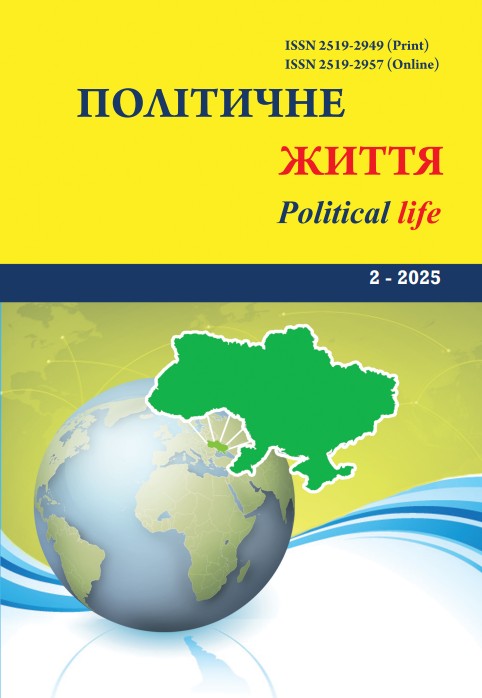Memetization of political parties: transformation of political communication in the digital era
DOI:
https://doi.org/10.31558/2519-2949.2025.2.9Keywords:
political memes, digital politics, political communication, political marketing, social media, youth political participation, internet cultureAbstract
The article explores the phenomenon of political parties' memetization as a contemporary trend in political communication. The research aims to analyze the key mechanisms of meme usage in political discourse and evaluate their impact on the transformation of political communication in the digital era. The methodological framework combines content analysis of political memes, comparative analysis of meme strategies employed by different political forces, and critical discourse analysis to examine the implications of memetization for democratic processes. The study is theoretically grounded in the works of modern researchers in political communication, media studies, and digital culture, which conceptualize memes as units of cultural information that spread through imitation and replication while acquiring social significance. The research identifies several levels of political parties' memetization: instrumental (using memes as tools for political marketing), structural (transforming organizational structures to accommodate meme logic), discursive (changing the articulation of political ideas through meme formats), and identificational (forming political identity through meme creation and sharing). The study reveals that memes function as effective tools for political mobilization, especially among younger voters, and contribute to the democratization of political communication by lowering barriers to political discourse. However, the memetization process also carries risks, including oversimplification of political discourse, increased polarization, and the spread of disinformation. The research demonstrates that Ukrainian political parties have adopted varying approaches to memetization, with different levels of effectiveness and strategic integration. The comparative analysis of meme strategies employed by major Ukrainian parties reveals significant differences in their content, targeting, virality, and overall effectiveness. The findings suggest that successful political memetization requires authenticity, ethical responsibility, and integration with other forms of political communication. The study concludes that memetization of political parties reflects broader transformations of the public sphere in the digital society and represents an important aspect of contemporary political processes. Understanding the mechanisms of political memes and their influence on political communication is crucial for developing democratic processes and fostering quality political discourse in the digital era.
References
Shifman L. Memes in Digital Culture. Cambridge, MA : MIT Press, 2014. 200 p.
Milner R. M. The World Made Meme: Public Conversations and Participatory Media. Cambridge, MA: MIT Press, 2016. 272 p.
Wiggins B. E., Bowers G. B. Memes as genre: A structurational analysis of the memescape. New Media & Society. 2019. Vol. 21, № 11. P. 2585–2603.
Mesario R. A., Pagliawan D. L., Balotol R. O. Jr. Memes, viral content, and digital stories: Constructing political narratives and mobilization. Social Ethics Society Journal of Applied Philosophy.Politics & Culture Special 2025. Issue. Vol. 2. P. 222–236.
Heylighen F. What makes a meme successful? Selection criteria for cultural evolution. URL: https://citeseerx.ist.psu.edu/viewdoc/download.
Запорожець О., Бєлоусова Н. Вербальні інтернет-меми під час повномасштабної війни рф проти України. Вісник Київського національного університету імені Тараса Шевченка. Міжнародні відносини. 2022. № 2 (56). С. 20–24.
Чернікова О. І. Вербальний мем: лінгвістичний аспект. Наукові записки Національного університету «Острозька академія». Серія «Філологічна». 2015. Вип. 51. С. 354–356.
Чаплак Я. В., Чуйко Г. В. Специфіка мемів у Інтернет-просторі сучасного суспільства. Scientific Collection «InterConf» : SCIENTIFIC GOALS AND PURPOSES IN XXI CENTURY (January 19-20, 2022). URL: https://archer.chnu.edu.ua/xmlui/handle/123456789/4592.
Запорожець О. Ю. Меметична зброя в інформаційній війні. Україна в умовах трансформації міжнародної системи безпеки: матеріали VII міжнародної наукової конференції. Львів, 13–14 травня 2021. С. 58–60.
Чернявська Л. В. Досвід дискримінації і тема дискримінації в мемах. Людина в українському суспільстві в системі цінностей прав людини: сучасний вимір медіадіяльності : матеріали Всеукраїнської науково-практичної конференції (Київ, 14 травня 2021 р.) Київ : Інститут журналістики, 2021. C. 337–340.
Чернявська Л. В., Кутова О. Інтернет-мем як складник медіареальності. Держава та регіони. Серія: Соціальні комунікації. 2021. № 4. C. 69–82.
Неклесова В. Ю. Меми українського сегменту інтернету. Записки з ономастики. 2016. № 19. С. 151–162.
Жулінська М., Смоляр Н. Інтернет-меми як одиниці інформації у кіберпросторі. Актуальні питання іноземної філології. 2015. № 2. С. 66–71.
Храбан Т. Є. Образ українки в інтернет-мемах. Молодий вчений. 2018. № 2. С. 333–339.
Соколова К. В. Меми як засіб комунікації в інтернет-середовищі. Гуманітарний часопис. 2012. № 1. С. 118–123.
Заботнова М. В. Інтернет-меми як засіб реалізації стратегічної комунікації. Філологічні студії. Збірник наукових праць. 2021. Вип. 17. С. 30–38.
Корольова Н., Грималюк А. Інтернет-мем як феномен сучасного медіадискурсу: стилістично-прагматичний аспект. Folium. 2023. № 1. С. 33–41.
Крижанівська В. Цифровізація політичної участі: загрози та перспективи. Грані. 2021. Том. 24. №9. С. 82–90.
Куріхін А. А. Меметизація у промоції діджитал-контенту на прикладі програми «В гостях у Гордона» та youtube-каналу svtv. Журналістика та реклама: вектори взаємодії : тези доп. ІІІ Міжнар. наук.-практ. конф. (Київ, 24 березня 2021 р.) С. 179–181.
McKelvey, F., DeJong, S., & Frenzel, J. Memes, scenes and# ELXN2019s: How partisans make memes during elections. New Media & Society, 2023. 25(7), 1626-1647..
McSwiney, J., & Vaughan, M. Parties vs. partisans: the real contest about what memes mean in election campaigns. Australian Journal of Political Science, 2024. 59(2), 216-235..
Collier, J. R., Kim, Y., & Murray, C. The composition and amplification of mainstream political memes: evidence from 4 US election cycles. Journal of Information Technology & Politics, 2024. 1-16.

